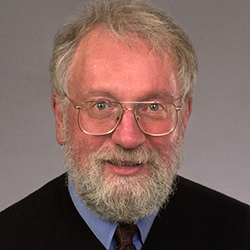Joel D. Howell M.D., Ph.D.
 Victor Vaughan Professor of the History of Medicine
Victor Vaughan Professor of the History of Medicine
Director, Program in Society and Medicine
University of Michigan Medical School
Email: jhowell@umich.edu
Discipline: Medicine, History
Expertise: Technology
Investigator Award 
Technology and Health Policy in the U.S. and England, 1925-1995Award Year: 1996 Through the lenses of social history and the sociology of knowledge, Dr. Howell examines the roots of how technology came to dominate the delivery of health care. He includes in his broad definition of technology the knowledge needed to apply it and the systems created for using it. His project explores America's obsession with medical technology and how it has specifically been applied to clinical medicine through the use of such imaging examples as the X-ray and computerized axial tomography (CAT scanners). How organizational innovations (e.g., managing the delivery of care) and computer technology moved from one field to another and with whose help are considered. Dr. Howell also seeks examples of technology transfer from health care to other fields. Comparison of differences in the use of technology in the U.S. and England provides insights into how technology is shaped by the social structure within which it is used.
Background 
Joel D. Howell is the Victor Vaughan Professor of the History of Medicine at the University of Michigan, where he is also a professor in the departments of internal medicine, health services management and policy, and history. He received his M.D. at the University of Chicago, where he also completed his internship and residency in internal medicine. At the University of Pennsylvania he was a Robert Wood Johnson Clinical Scholar and received his Ph.D. in the history and sociology of science. Howell is the director of the University of Michigan Program in Society and Medicine and previously served as the co-director of the University of Michigan Robert Wood Johnson Clinical Scholars Program. He has written widely on the use of medical technology, examining the social and contextual factors relevant to its clinical application and diffusion and analyzing why American medicine has become obsessed with its use. His current research attempts to analyze the implication for health policy of factors that have both contributed to and slowed the diffusion of medical technology into clinical practice. His most recent book is Technology in the Hospital: Transforming Patient Care in the Early Twentieth Century (1995).
- Howell, J.D. The Lost Art of Caring: A Challenge to Health Professionals, Families, Communities, and Society, In A History of Caring in Medicine, eds. Cluff, L.E., Binstock, R.H. Baltimore: Johns Hopkins University Press, 77-103, 2001.
- Howell, J.D. Hospitals, In Medicine in the 20th Century, eds. Cooter, R., Pickstone, J. Amsterdam: Harwood, 503-18, 2000.
- Olken, M.H., Howell, J.D. The Cambridge World History of Food and Nutrition, In Nutrition and Heart-Related Diseases, eds. Kiple, K.F., Ornelas-Kiple, C.K. Cambridge University Press, 1097-1109, 2000.
- Howell, J.D., Electrocardiograph, in Instruments of Science: A Historical Encyclopedia, eds. Bud, R., Johnston, S., Warner, D. New York: Garland Publishing, 204-7, 1998.
- Howell, J.D. Maintaining Connections: Some Thoughts on the Value of Intensive Care Unit Rounding for Gernal Medicine Ward Teams. Annals of Internal Medicine, Sep 6 2011, 155: 323-324.
- Howell, J.D. What the Doctors Read. JHPPL, 2004, 29(4-5): 781-97.
- Howell, J.D. The Paradox of Osteopathy. NEJM, 1999, 341(19): 1465-67.
- Howell, J.D. The Physician's Role in a World of Technology. Academic Medicine, 1999, 74(3): 244-7.
- Howell, J.D.ÊMaking a Medical Practice in an Uneasy World. Academic Medicine, 1997, 72: 977-81.
- Howell, J.D.ÊWhy Medical Students Are 'Medical Students'.ÊJ of General Internal Medicine, 1997, 12(11): 718-9.
